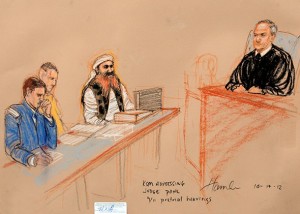Khalid Sheikh Mohammed’s defence team lost a member earlier this week. On 26 March 2014, after nine years in the US Army, Major Wright tendered his resignation. Tuesday 26 August 2014 was Wright’s last day as appointed counsel for Mohammed.

Khalid Sheikh Mohammed during the third day of pretrial hearings at Guantánamo Bay, Cuba, Oct. 17, 2012 ©Janet Hamlin/Reuters,Reuter MED/MED
Wright was appointed in December 2011 to the defence of Mohammed, the purported mastermind of the 9/11 terror attacks and executioner of journalist Daniel Pearl who is facing, along with three co-defendants, death sentence if convicted. Captured in Pakistan in 2003, Mohammed was first held at various CIA black sites before being transferred to Guantánamo in 2006. He is one of the two al Qaeda prisoners on whom the CIA publicly confirmed in 2008 waterboarding was used.
While Wright’s resignation cannot directly evidence the Army’s intent to remove him from the team, it only contributes to further diminish the appearance of legitimacy of the Guantánamo military commissions. Wright decided to leave the Army as he was not able to continue his defence work: required to attend a nine-month graduate program in military law, Wright was denied a deferral. The choice was clear-cut: either quit Mohammed’s defence team and attend the graduate program, or resign from the Army. In conflict with his ethical obligation to continue representing his client, after a long period of building trust with a client who was tortured and guarded by people wearing the same uniform as him, Wright eventually quit.
Established by the Bush administration, the first military commissions in Guantánamo were invalidated by the United States Supreme Court in 2006 as they lacked the assurances of a fair trial under the U.S. Constitution and the Geneva Conventions. Enacted in 2009, a revamped Military Commissions Act was to ensure greater transparency and at least the appearance of a fair trial, including provisions affording more autonomy to defence attorneys. In April 2011, Attorney General Eric Holder announced that Khalid Sheikh Mohammed would be tried under one of these the new commissions.
Although Brig. Gen. Mark Martins, the chief prosecutor at Guantanamo Bay assigned to the U.S. v. Mohammed case, made every effort to ensure legitimacy of the prosecution, the proceedings have been tarnished by governmental intrusions, including the release of a half-million defence attorney emails to prosecutors, the discovery of hidden microphones placed by the FBI in attorney-client conference rooms, and allegations that FBI agents have been spying on defence teams.
